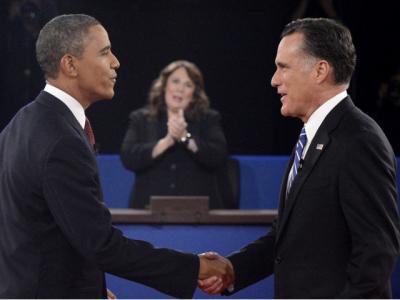By Black Agenda Report executive editor Glen Ford

To any objective observer, the consensus that exists between Barack Obama and Mitt Romney on the fundamental issues of war and peace, Wall Street’s dominance of American life, and fiscal austerity, has been made crystal clear in the two “debates.” In the absence of effective popular resistance to the duopoly of money, the economic and social crisis fails to create a corresponding political crisis for the rulers. As a result, there is nothing important for them to debate.
“There is consensus within the duopoly that austerity must be the watchword – despite the Occupy Movement.”
The two titans of America’s finance capitalist duopoly clashed – leaving behind a dull fart. It was as if the town hall at Long Island’s Hofstra University was hermetically sealed against the raging realities of a world and nation in systemic crisis. For 90 minutes, not one useful fact or thought was allowed to enter or escape.
This is what happens when the terminal decline of the old order is not met by effective resistance from those who suffer under its dead weight. What to do about a jobs crisis that has left millions permanently unemployed from effects of the last two recessions? Apply additional corporate “incentives” to boost investment (Obama) or a thicker layer of laissez fair (Romney). And, by all means, extract more energy (Obama and Romney) from the exhausted environment, as if lack of fuel is what has stalled the engines of late capitalism. But do not, under any circumstances, question the inherent right of bankers (a.k.a. “markets”) to dominate every aspect of economic and political life.
Banks were mentioned only three times: once, by Romney, in connection with (of course) cutting taxes, and twice by Obama. The president is proud that his mother was the vice president of a small bank, and he took credit (deservedly) for denying banks their $60 billion cut of college student loans. But the funneling of $16 trillion in guarantees, grants and virtually “free” money to financial corporations over the last four years – a profound restructuring of the relationship between the State and Wall Street – has been unmentioned in all three debates to date, because it is a policy consensus within the duopoly.
“Do not, under any circumstances, question the inherent right of bankers (a.k.a. ‘markets’) to dominate every aspect of economic and political life.”
Romney owned the word “poverty,” just as did the Republican nominating convention in Tampa, while Obama uttered the term not once. Corporate media pundits and even many “progressives” accept the Democrat’s avoidance of the subject as understandable, since he is an incumbent. Yet, the fight against poverty was Franklin Roosevelt’s rallying cry during capitalism’s previous great crisis, and Lyndon Johnson initiated a War on Poverty. Today’s poverty rate hovers only a fraction of a percent below the level of 1965, but the standard-bearer of the party most identified with the poor has nothing to say on the matter. Instead, there is consensus within the duopoly that austerity must be the watchword – clear evidence that the Occupy Movement is no longer a felt threat.
Romney is more “liberal” in the use of the term “poverty” only because his vision of laissez fair trickle-down to the poor is more fantastical (12 million jobs, just you watch!). Just as in the summer of 2011, all that separates the Obama and Republican wings of the Wall Street duopoly is the question of “modest” tax increases for the very rich. But both factions are intent on cuts of around $4 trillion dollars, mainly on non-military programs. Why should Americans whose vital governmental support is targeted for chopping be concerned whether or not some millionaires are also discomforted in the process? Are the poor and struggling classes supposed to accept the loss of the necessities of a dignified life, on condition that some rich people pay a modest financial tariff?
“There is also no daylight between the contenders on drone warfare or the continued projection of U.S. power.”
The consensus on imperial war is near absolute. What passes for argument is merely a matter of style and posture. Romney attacks Obama for failing to grasp or reveal the “terrorist” nature of the fatal attack on the U.S. ambassador in Libya. But both candidates are wedded to an alliance with Muslim fundamentalist jihadis against Middle East governments targeted for destabilization or regime change: Syria and Iran. Obama’s obfuscations on Benghazi were an attempt to continue masking the nature of the Libyan legions armed by the U.S. as proxies against Gaddafi, many of whom are now deployed in Syria – a mission with which Romney is in full accord. There is also no daylight between the contenders on drone warfare or the continued projection of U.S. power in the “Af-Pak” theater of war, or in Somalia and Yemen. The War Party wins in November, regardless of the Electoral College outcome.
Despite the profound, systemic crisis of the global capitalist financial order and its U.S. imperial gendarme, there exists no political crisis for the rulers, because there is no serious internal resistance. These theatrical productions may pass for debates, but it’s really just the passing of gas within a closed Wall Street consensus.
BAR executive editor Glen Ford can be contacted at Glen.Ford@BlackAgendaReport.com [5].
[6]
duopoly Presidential debates Wall Street Hegemony
Source URL: http://blackagendareport.com/content/duopoly-debates-itself
Let’s keep this award-winning site going!
| Yes, audiences applaud us. But do you?If yes, then buy us a beer. The wingnuts are falling over each other to make donations…to their causes. We, on the other hand, take our left media—the only media that speak for us— for granted. Don’t join that parade, and give today. Every dollar counts. |
|---|
| Use the DONATE button below or on the sidebar. And do the right thing. Even once a year. |
Use PayPal via the button below.
THANK YOU.




